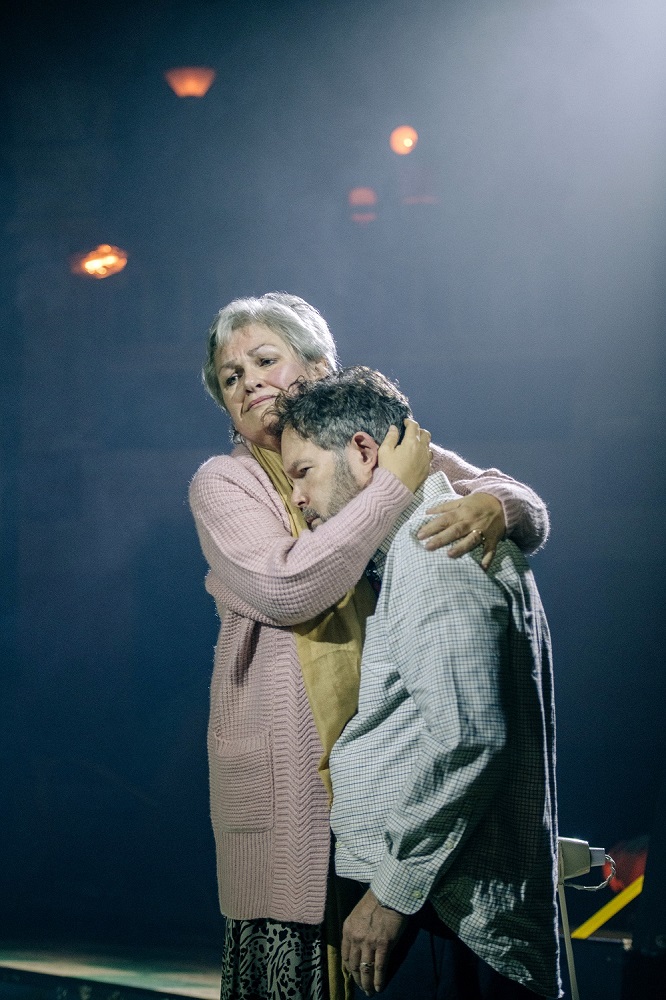Which is the locked-in character of the two in Bluebeard’s Castle? In composing his one-act masterpiece of shattering profundity, composer Bartók clearly intended Bluebeard’s as “the tragedy of a soul destined to be alone”; the woman Judith unlocks five doors to his psyche, but two more doors must be left shut. Director Daisy Evans and conductor Stephen Higgins, who last Thursday wrote eloquently for theartsdesk about this production’s basis in personal experience, decide that Judith is the isolated one, a person sinking further into dementia most of us can recognize from sad experience.
The execution of this idea can’t fail to be moving in parts, especially given the astonishing performances we saw on Saturday afternoon from Susan Bullock and Gerald Finley – they alternate with Gweneth Ann Rand and Michael Mayes – but inevitably, perhaps, the points of contact between the opera and the concept sometimes have to be forced open.
Certainly you gain almost as much from an intimate staging in an atmospheric setting, with a six-piece ensemble made up of players from the London Sinfonietta, as you lose from the usual experience of the work in concert or standard opera house with full orchestra. Some of Bartók’s special effects for the original tableaux envisaged behind the seven doors are diminished (though not the garden or the pool of tears, where the celesta still plays its spooky part). But the key sonorities of clarinet and horn keep the very Hungarian inflections of the instrumental lines alive.
 It takes at least the first of the revived memories involving five other performers – Evans’s replacement for the symbols of Bluebeard’s soul – to work out the big idea, or at least it did for me: was this Judith remembering an affair her husband had with a younger woman? No, it turned out to be the couple’s pre-nuptial passion. What comes out of the trunk on stage revives chronological key points: husband going off on duty, wedding, childbirth, the zenith of family happiness (the one which didn’t quite achieve the desired effect, though it might on film). Tears of familial bereavement made good sense – you could understand why the husband/Bluebeard wouldn’t want to revisit this one – and the expected revelation of the three other wives carried through the inevitability movingly enough. Frankly, the only thing that could justify Bartók’s shattering last climax would be what we see in Michael Haneke’s film Amour, but the lead up to it forged an unforgettable stage image as the husband only wants the wife to kiss him but she sings insistently of her demand into his mouth. Generally the sense of the awful situation was circular, not a linear ratcheting-up of the tension that you get in the original scenario and its realisation.
It takes at least the first of the revived memories involving five other performers – Evans’s replacement for the symbols of Bluebeard’s soul – to work out the big idea, or at least it did for me: was this Judith remembering an affair her husband had with a younger woman? No, it turned out to be the couple’s pre-nuptial passion. What comes out of the trunk on stage revives chronological key points: husband going off on duty, wedding, childbirth, the zenith of family happiness (the one which didn’t quite achieve the desired effect, though it might on film). Tears of familial bereavement made good sense – you could understand why the husband/Bluebeard wouldn’t want to revisit this one – and the expected revelation of the three other wives carried through the inevitability movingly enough. Frankly, the only thing that could justify Bartók’s shattering last climax would be what we see in Michael Haneke’s film Amour, but the lead up to it forged an unforgettable stage image as the husband only wants the wife to kiss him but she sings insistently of her demand into his mouth. Generally the sense of the awful situation was circular, not a linear ratcheting-up of the tension that you get in the original scenario and its realisation.
Bullock and Finley could not have been more plausible in their realism, though. The luxury of having them perform in this small space is akin to the Liaisons Dangereuses experience of getting Dominic West and Janet McTeer at the Donmar Warehouse on the other side of Charing Cross Road, The soprano’s disturbingly real incarnation of a person with dementia undergoes scrutiny at very close quarters – a future role in film beckons, like Galina Vishneskaya’s amazing performance as Sokurov’s The Mother – and it’s uncannily at odds with the tonal beauty which is still hers, coloured to blend with the instrumental timbres in what becomes the first-born sequence. Finley’s nuances are no less beautiful, the sudden violence and anguish visceral, the intent very different from his recent performance with Karen Cargill's opulent Judith and the London Symphony Orchestra conducted by SImon Rattle (I was very lucky to be there at a time during semi-lockdown when large ensembles couldn't otherwise be experienced). Be careful where you sit, though: with the wind players very loud behind me, even the impeccable diction of the two performers was sometimes smothered.
Kudos to the company for including diversity in the action. I overooked the fact that there is also Judith's Castle, with a score by the singular young composer Electra Perivolanis, featuring Rand, Mayes and four players from the Sinfonietta: there had been a performance two hours earlier, and one more follows at 2pm on 13 November, which I'll endeavour to catch. The possibilities of this former Welsh chapel and famous nightclub as a performance space are very exciting, too.














Add comment